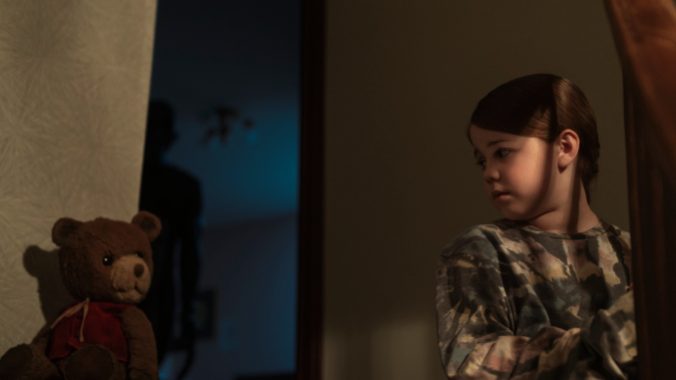Imaginary Is an Imaginary Horror Movie

With the worrying proliferation of artificial intelligence now frequently implemented (or encouraged to be used) towards creative endeavors, we jest when we come across something ostensibly human-made that nevertheless feels born of AI. It’s a bleak, if facetious, admittance of our own potential incapability to distinguish what’s man-made trash and what’s robot-made. Case in point: While watching the new Blumhouse horror film Imaginary—directed by Truth or Dare and Kick-Ass 2 auteur Jeff Wadlow—the question around the extent to which AI was or was not utilized was constantly present in my mind, to the point where I felt I was legitimately going insane.
The screenplay of Imaginary is credited to humans. Three to be exact: Wadlow himself, Greg Erb, and Jason Oremland. And yet there is nothing in the film which doesn’t appear to be pulled from an algorithmic ether and designed to hit all the right buttons of what an audience would presumably want to see in a horror film…because they’ve already loved it in the past. Our story follows Jessica (DeWanda Wise), an artist and author of a popular children’s book series, who moves back into the childhood home after her deteriorating father has been placed in an assisted care facility. She’s accompanied by her tattooed hipster musician husband Max (Tom Payne) and Max’s two daughters from a previous marriage, mouthy teenager Taylor (Taegen Burns) and the much younger Alice (Pyper Braun). Unsurprisingly, this previous marriage was to a mentally unwell woman who went insane for undisclosed reasons and got herself locked up in an asylum. Also, unsurprisingly, she later escapes from said institution to warn her daughters of the impending horrors that await them, because neurodivergent people typically have the psychic ability to sense foreboding supernatural doom (we’ve seen this all play out before, of course).
While exploring her new home’s creepy basement, a basement that looks like every other creepy basement in a million other horror movies, Alice, a precocious girl who speaks like an adult in a child’s body trying to mimic how children speak, finds a hidden door which leads to a worn, abandoned teddy bear named Chauncey. Alice attaches herself to the toy and begins to manifest Chauncey as her imaginary friend. And it’s not too long before her behavior starts rapidly altering as she appears to be doing her new friend’s bidding—like embarking on an innocent scavenger hunt that requires Alice to slam her little palm into a rusty nail.
Jessica manages to stop this heinous act at the last moment, which is probably a more stressful time bonding with her stepdaughters while Max is away touring with his band (???) than she probably anticipated. Eventually, Jessica unlocks more of her traumatic past, and the strange puzzle pieces of the situation begin falling into place. When she was just five, she was sent to live with her grandparents after her father went insane following the death of Jessica’s mom. But Jessica realizes that this past involves the same Chauncey who Alice now totes around having full conversations with, who tells Alice that she’s going somewhere called the “never ever.”
Meanwhile, Taylor, incensed at the idea of having to kowtow to a fake mother, acts out by bringing a neighborhood boy over who promptly insults her younger sister and tries plying Taylor with molly that later turns out to be allergy medicine. While trying to manage the stresses of new motherhood and an encroaching and unknowable evil, it’s up to Jessica to unlock the repressed secrets of her past to keep Alice from being transported to the world of a malignant spirit that wants to play with her forever.
That aforementioned scenario with the neighbor boy and the fake drugs is just one of a seemingly endless supply of absurd, narratively jarring situations, conversations and plot points. Sometimes these scenes are downright laugh out loud, like the baffling introduction of an elderly woman referred to as “Old Bag Patterson” by the delinquent young neighbor, the teen drug bust, or when Alice’s therapist is so alarmed by a “conversation” she observes the child having with Chauncey that she gravely asks Jessica if Alice has taken up ventriloquism as a new hobby.
-

-

-

-

-

-

-

-

-

-

-

-

-

-

-

-

-

-

-

-

-

-

-

-

-

-

-

-

-

-

-

-

-

-

-

-

-

-

-

-








































